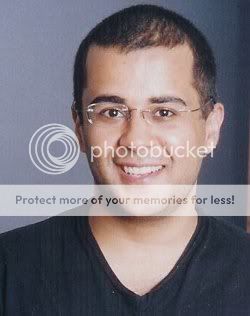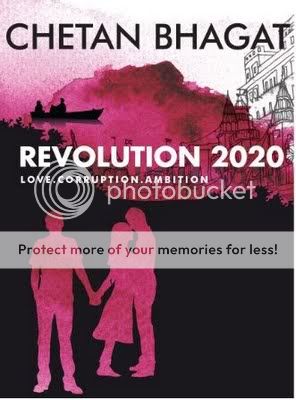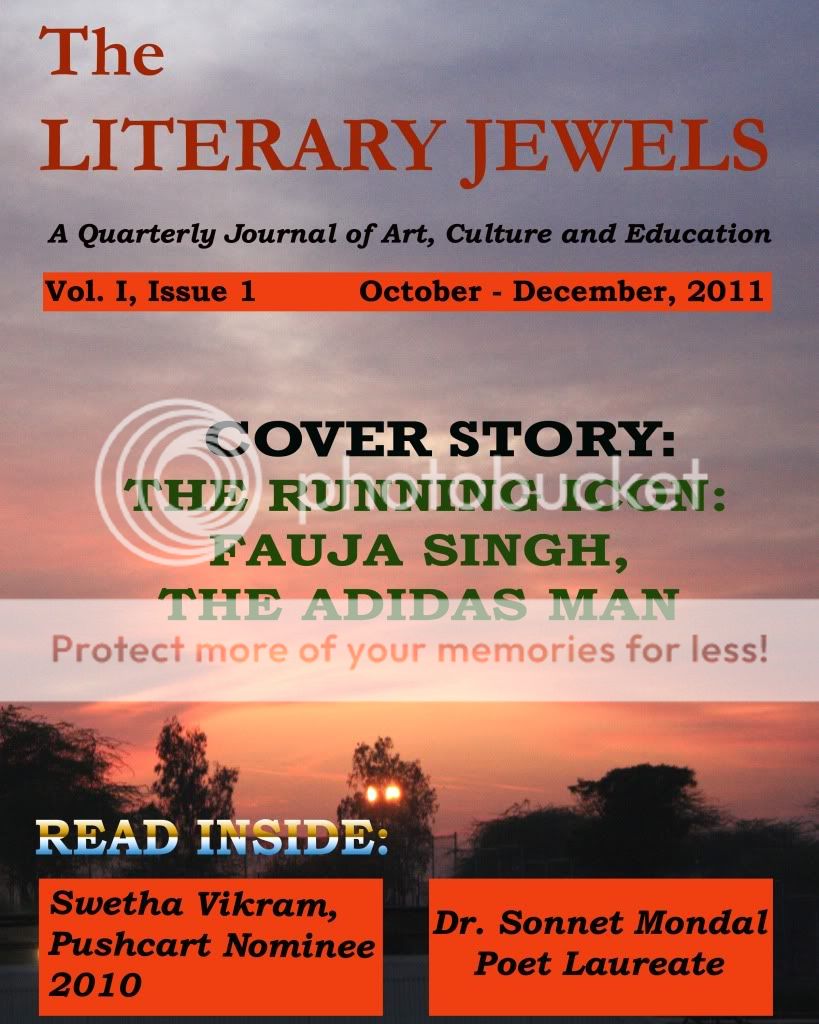 |
| Chetan Bhagat |
Chetan Bhagat's much talked about book 'Revolution 2020', his fifth one, was released in New Delhi on 8 October, 2011 by Yuvraj Singh, the cricketer. On the release Yuvraj jokingly related the title of the book to the concept of 20:20 cricket. Calling Yuvraj Singh for the book release was a nice publicity stunt! The book is already set to create a record of sorts. According to Rupa Publications, this book release could very well go down in history as the biggest one because they said that they have already shipped 5,00,000 (five lakhs) copies ordered in advance. Now the challenge before them is to see to it that the print is able to meet the demand.

The full title of the book is 'Revolution 2020: Love, Corruption,Ambition'. The story in the novel happens in the city of Varanasi. Against the backdrop of corruption, the novel narrates a love triangle. That's perfect bollywood masala again!
In Chetan Bhagat's own words, "The book is dedicated to 'the' Indian student and captures the dilemmas and pressures a student goes through in the corrupt and ruthless world of competitive exams."
Here's excerpt from the book 'Revolution 2020: Love, Corruption, Ambition':
PROLOGUE OF 'REVOLUTION 2020: LOVE, CORRUPTION, AMBITION'“And I hope not just you but our whole country will keep that spark alive. For there is
something cool about saying – I come from the land of a billion sparks. Thank you,” I said,
ending my motivational speech at Tilak Hall, Varanasi.
The claps and whistles were my cue to leave. Security volunteers formed a human barricade
and soon I managed a neat exit from the hall.
“Thank you so much, sir,” someone said right behind me.
I turned around to face my host.
“Mr Mishra,” I said, “I was looking for you.”
“Please call me Gopal,” he said. “The car is over there.”
I walked out with the young director of GangaTech College, Gopal Mishra. His black Mercedes
whisked us away from the crowded Vidyapath Road.
“Any more temples you want to see?” Gopal asked. “That’s all Varanasi has, anyway. You saw
the ghats, right?”
“Yeah, I went to the Vishwanath temple and Dasaswamedh ghat at five in the morning,” I said.
“The aarti was out of the world.”
Gopal frowned.
“What?” I said. “You must be used to the aarti by now. I was seeing it for the first time, all
those diyas floating at dawn.”
“It is not that,” he said, but did not elaborate.
“You will drop me at Ramada hotel?” I said.
“Your flight is only tomorrow morning,” Gopal said. “Why don’t you come home for dinner?”
“Don’t be formal…” I began.
“You have to come home. We must have a drink together. I have the finest whiskey in the
world,” he said.
I smiled as I shook my head. “Thanks, Gopal, but I don’t drink much.”
“Chetan sir, one drink? I can tell people I had a drink with ‘the’ Chetan Bhagat.”
I laughed. “That’s nothing to brag about. Still, say it if you want. You don’t actually have to drink with me.”
“Not like that, sir. I actually want to have a drink with you.”
I saw his intense eyes. He had sent me twenty invites in the last six months, until I agreed to come. I knew he could persist.
“Okay, one drink!” I said, hoping I wouldn’t regret this later.
“Excellent,” Gopal said.
We drove ten kilometers outside the city on the Lucknow Highway to reach GangaTech. The guards saluted as the campus gates opened up. The car came to a halt at a gray bungalow. It had a stone exterior that matched the main college and hostel buildings. We sat in the living room on the ground floor. It opened out to a badminton court-sized lawn.
“Nice house,” I said as I sat on an extra-soft brown velvet sofa. I noticed the extra-high elevated ceiling.
“Thanks. I made it myself. The contractor built it, but I supervised everything,” Gopal said. He proceeded to the bar counter at the other end of the room. “It’s the bungalow of an engineering college director. You and your friends raided one, right?”
“How do you know?” I said.
“Everyone knows. We’ve read the book. Seen the movie.”
We laughed. He handed me a crystal glass filled with a generous amount of Irish whisky.
“Thank you.” I took my drink.
“Single malt, 12 years old,” he said.
“It’s the director’s bungalow, but you don’t have a daughter,” I said. “You aren’t even married.
The youngest director I’ve ever seen.” He smiled.
“How old are you?” I was curious.
“Twenty-six,” Gopal said, a hint of pride in his voice. “Not just the youngest, but also the most
uneducated director you’ve met.”
“Uneducated?”
“I never went to college.”
“What?” I said as I twirled the ice-cubes in my glass and wondered how potent this drink was.
“Well, I did do a joke of a correspondence degree.”
“Wow!” I said. “It isn’t a joke to open such a big college.”
“Sixteen hundred students now, ji, across all batches. Each paying one lakh a year. We already have a sixteen-crore turnover. And you inaugurated the MBA coaching today. That’s another new business.”
I took a sip. The smooth whiskey burnt my throat. “Do you have beer? Or wine?” I coughed.
Gopal’s face fell. Not only had I ignored his impressive business statistics, I had rejected his whiskey.
“Not good?” Gopal asked. “It’s Glenfiddich, four thousand a bottle. I’ll open Blue Label? That’s ten thousand a bottle.”
It is not a price issue, I wanted to tell him but didn’t. “I don’t drink whiskey. Too strong for me,” I said instead.
Gopal laughed. “Live life. Start having fine whiskey. You will develop a taste.”
I attempted another sip and winced. He smiled and poured more water in my drink to dilute it.
It ruined the scotch, but saved my sanity.
“Life is to be enjoyed. Look at me, I will make four crores this year. What is the point if I don’t
enjoy it?”
In most parts of the world, speaking about your income is taboo. In India, you share the figures
like your zodiac sign, especially if you have lots.
He seemed to have put the question more to himself than me. His dark eyes continued to bore into me. His eyes demanded attention. The rest of him – wheatish complexion, modest fivefeet-seven-inch height, side-parted hair – was reassuringly nondescript.
“Yeah, of course. One should enjoy,” I said as he cut me.
“Next year I will make five crores.”
I realised he would keep forecasting his salary until I demonstrated suitable awe.
“Five crores!” I said, my voice loud and fake.
Gopal grinned. ‘Baby, eat this, for I have made it,’ is probably the T-shirt slogan he would choose.
“That’s incredible,” I murmured, wondering how I could switch the topic. I noticed stairs winding up. “What’s upstairs?” I said.
“Bedrooms and a terrace. Come, I will show you.”
We climbed up the steps. We walked past a room with a luxurious king-sized bed. From the terrace I took in the panoramic view.
“This was a wasteland, all of it. My grandfather’s old agricultural land,” Gopal said.
“Ten acres?” I made a guess.
“Fifteen. We had fifteen acres more,” Gopal said, “but we sold it to fund the construction.”
He pointed to a small array of lights towards the eastern wall of the floodlit campus. “Right there, see. There is a mall coming up.”
“Every Indian city is building malls now,” I said.
“India shining, Chetan-ji,” he said and clinked his glass with mine.
Gopal drank more than four times my pace. I hadn’t finished my first when he poured his fifth.
“You big-city types. Drinking for style,” he teased when I refused a refill.
“I don’t drink much. Really,” I said. I checked the time; 10:00 p.m.
“When do you eat dinner?” he asked.
“Up to you,” I said, though I wished he’d decide to eat right away.
“What is the big hurry? Two men, one educated, one uneducated. Having a good time,” Gopal said and raised his glass in the air.
I nodded out of courtesy. My stomach rumbled for food. We came downstairs to sit down in the living room again.
“Did you really go to the professor’s daughter’s house?” Gopal said.
I smiled. “Love makes us do stupid things.”
Gopal laughed out loud. He chugged his drink bottoms-up, then grabbed the half-empty bottle to make his sixth tipple.
“Love? Forget stupid things. Love fucks you,” Gopal said.
“That’s harsh,” I said. “Is that why there is no Mrs Director yet?”
Gopal’s hand trembled as he continued to pour his drink. I wondered if I should stop him from drinking more.
“Mrs Director!” Gopal smirked. He gripped the whiskey bottle tight.
“Easy, Gopal, you are drinking too fast. It’s dangerous.”
Gopal plonked the bottle on the coffee table. “Why dangerous? Who is going to fucking cry for me? If I live, I want to enjoy. If I die, who cares?”
“Your parents?”
Gopal shook his head.
“Friends?”
“Successful people don’t have friends,” Gopal demurred. “It’s true, no?”
His lavish house felt cold and isolated. I took the whiskey bottle and placed it back in the bar.
“Pessimist, eh?” I said. “Surprising, given you are doing so well.”
“What well, Chetan-ji?” Gopal said, now completely drunk and, presumably, completely honest.
He pointed to the huge TV, stereo system and the silk carpet under our feet in quick succession.
“What does all this mean? I’ve lived with nothing…”
Our conversation had become serious. I patted his back to cheer him up. “So you read about my girlfriend in the book. How about you? You ever had one?”
Gopal didn’t respond, but looked distraught. He placed his glass on the coffee table. Touchy topic, I figured too late. He retched.
“Are you okay?” I said.
He ran to the restroom. I heard him throw up. I browsed the display shelves to pass time. I saw framed news stories about GangaTech, trophies, pictures of Gopal with guests who had visited the college. I wondered if my picture would also be there soon. When he hadn’t returned in twenty minutes I called for the maid. She took me to the bathroom. I knocked at the door. No answer. I banged my fists on the door. Nothing.
“Looks like we have to break the door,” the maid said.
I wondered how I, who had come as a chief guest for a college orientation programme, became involved with forcing open random toilets in Varanasi....
To read ahead you will have to grab your own copy...Do share your views about the book once you get over with it.








